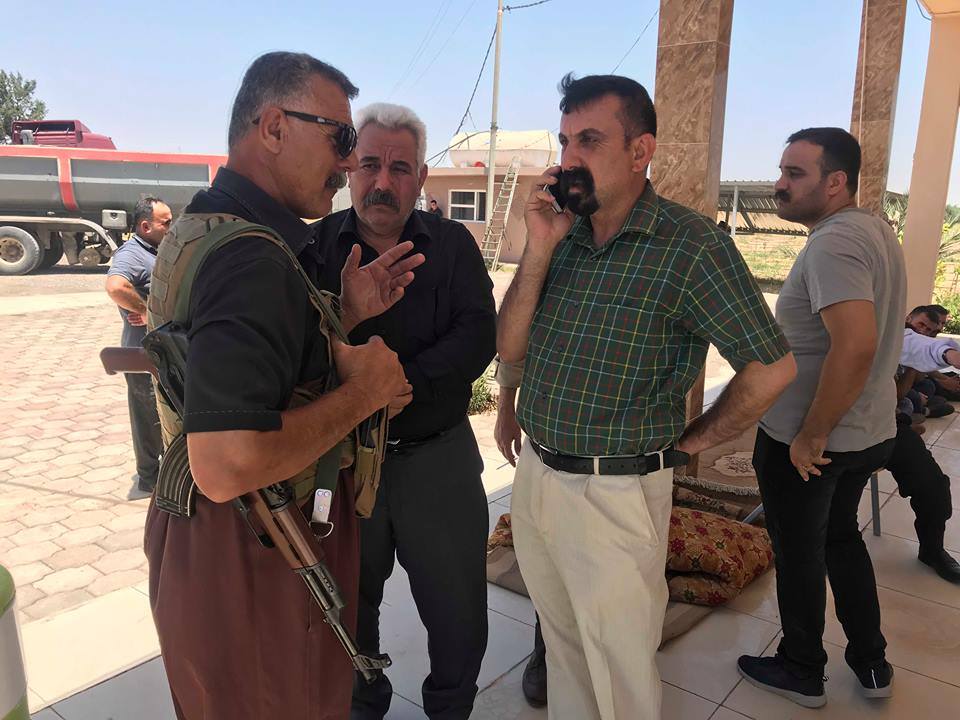The Kaka’i minority in the disputed towns of Daquq and Khanaqin are left with three options: evacuation of their villages, forming a Kaka’i security force or protection by the special guards of the Iraqi president until security is restored. It is unknown which one of the options will be chosen for their survival in their home regions.
The three options were proposed to the Iraqi President Barham Salih, when he met with a number of Kaka’i figures at the presidential palace in Baghdad.
The meeting took place due to numerous attacks on the Kaka’i minority in Kirkuk’s district Daquq and Khanaqin district in Diyala. Since the outbreak of the Coronavirus three months ago, many members of the Kaka'i minority have been killed, faced threats, and their crops set on fire.
Shamsala Goran, who participated in the meeting with the Iraqi president as the representative of Kaka’is in Khanaqin, told KirkukNow: “We explained the threats posed to the Kaka’is in Khanaqin, Daquq and the other disputed areas to the Iraqi president. We told him candidly that if they do not protect our lives and solve the security issue, we would be forced to evacuate our villages.”
Beside the option to evacuate their villages, they have proposed two other options to the president, namely “establishing a force consisting of members of the Kaka’i community, or deploying the presidential guards to the Kaka’i areas until security is restored,” Goran said.
The insurgent attacks on the Kaka’is in the disputed areas have surged with the outbreak of the novel Corona virus. Security forces are mandated to impose a curfew to contain the spread of the virus. The curfew has been announced since mid-March.

Kirkuk, Kaka’i members are gathering in Ali Saray village after the abduction a Kaka’i person, 2017. Photo: KirkukNow
Since the outbreak of the virus, 15 members of the Kaka’i community were killed, and eight have been injured in Daquq and Khanaqin, according to numbers recorded by Kaka’is in Sulaimaniya and Halabja.
The Kaka’i community in Sulaimaniya and Halabja issued a statement in which they say that “great damage has been inflicted on the Kaka’is in Daquq and Khanaqin, including burning their farms and destroying the irrigation system of their farms.”
“If the targeting of the Kaka’i is not prevented, they will face a massacre,” the statement mentions.
Goran added that “the geography of the Kaka’i villages is at the confrontation line between the extremist groups and the security forces. Majority of the villages are located in the disputed areas, the fate of which is still not determined in accordance with the constitution, which makes the attacks possible.”
“Since our villages are located in the disputed areas, both the Iraqi forces and the Peshmerga forces could be stationed there based on Article 140 of the constitution. That is better for us as cooperation will increase and we will be better protected.”
Two sources close to the Iraqi president told KirkukNow that President Barham Salih and Prime Minister Mustafa al-Kadhimi are attempting to find a solution for the issues the Kaka’i community face and that they will soon meet to discuss the matter.
Press conference of the Kaka’i minority in Sulaimaniyah and Halabja against the attacks on the Kaka’i people in the disputed towns of Daquq and Khanaqin on June 18.
One of the sources, who preferred to remain anonymous, said that “deploying presidential guards to the areas is hard and forming a Kaka’i force is beyond the authority of the president, so he and Kadhimi are looking for other solutions.”
Goran further added that “the Iraqi president has comprehensive knowledge on the area and said that he will discuss the situation with the prime minister to try finding a solution.”
“The Iraqi president said that the Kaka'is are an integral part of Iraq and should not be ignored.”
While waiting for such a meeting for a solution to be found, the Kaka’is in the meantime are at risk of losing this year’s agricultural products at their farms and all their efforts and expenses put into them going to waste.
Mohammad Aziz, a Kaka’i farmer in Haftaghar area in Daquq, told KirkukNow: “Because of the Coronavirus and the security situation, the harvesting season of our products are delayed. For instance, in previous years, when our okra was ready for harvest the price was high. We would get 2,000 Dinars [$1.66] for a kilogram, but now a kilogram is worth 750 Dinars [$0.62]. It would be better for us if security is improved and the Coronavirus goes away.”
The Kaka’is do not accuse a specific group for the attacks but rather call them “a terrorist group.”
The statement calls for a certain mechanism to protect the Kaka’i community in Daquq and Khanaqin, and they hold the federal and regional governments accountable for their protection.
Kaka’i figures meeting with the Iraqi president, Barham Salih on June 21
It also urges the Global Coalition to Defeat Daesh/ISIS and human rights organizations to play their roles in their protection.
The Kaka'is have now put their hopes in the promises of the Iraqi president and eagerly await a decision that would lead to the protection of their lives and livelihood.
However, Zyad Sheikh Fahad, chief of one of the Kaka’i tribes in Daquq, said: “Before the Coronavirus outbreak, we informed the Iraqi president about the threats, and they formed a military committee to investigate, but it resulted in nothing.”
“Before the Coronavirus, we were targeted in a few areas, but we are currently targeted in many areas, and the number of the attacks has surged.”





